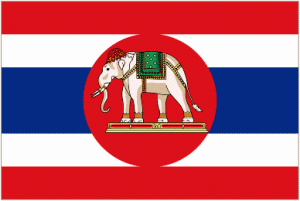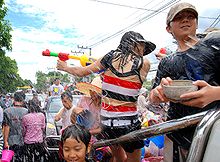April 13-16

Songkran is believed to have originated with the Dtai people (now in northern Thailand, Vietnam and Laos) as a fertility festival. Like the Hindi festival Sankranti, the word Songkran derives from the Sanskrit “Sankranti” comes from to the sun’s transition from one zodiac sign to another, in this case Pisces into Aries, and from the Pali word (of Theraveda Buddhist texts) “Sankhara“.
According to http://www.beachpatong.com/photogallery/songkran:
“Songkran is a Public Spring Cleaning Day, supported by the religious belief that anything old and useless must be thrown away or it will bring bad luck to the owner.”
[Ed.: My mother would love this holiday.]
Another tradition of Songkran is the formulation of predictions about the year to come:
“…the predictions come in the presence and posture of the divine, mythical ladies that are Nang Songkran. How will the weather be? Will the economy prosper? Will a fatal pandemic strike? How will crops yield? These common concerns for the largely agriculture-based Thai society will be answered by a simple calculation of the time the sun enters Aries – which indicates which one of the seven Songkran goddesses descend to Earth and in what posture she comes.”
But the most notable traditions of the festival are those involving water. Songkran season is the hottest time in Thailand. Originally the ritual of lightly sprinkling one’s elders with water was a sign of respect during the last days of the festival. Nowadays however, water activities have taken over every day of the festival, and in places like Chiang Mai, Thais celebrate by waging water battles on a scale unseen in the Northern Hemisphere.

“Packed into the back of the utes were about 9 or 11 people, a big plastic tub full to the brim of water, and our array of weapons – plastic buckets, plastic half buckets used to flush the toilets, and water pistols with special water tanks strapped onto backs. As we headed into town, people and children were clustered at points along the way in formidable armies with hoses, buckets and big tubs of water. Our driver would slow down and we were ruthlessly soaked about five minutes into our journey. We retaliated, scooping water out of the tub, yelling ‘LEFT!’ and ‘RIGHT!’ depending on where the next group of people were.”
Some are less thrilled about the festival’s recent evolution:
The overenthusiastic water play in which visitors to Chiangmai heartily participate on their first experience in Chiangmai represents a development of customs relating to the celebration of the Thai lunar new year…In the past people might sprinkle a bit of scented water on your shoulder to wish you a happy new year, but this has deteriorated to getting dowsed with a bucket of ice water by an individual on the back of a moving pickup truck.” “In some people’s viewpoint it has become excessive and many prefer to remain at home with a good book or a video rather than expose themselves to a daily drenching.”
The festival lasts several days, the first day being April 13, or Wan Songkran Lohng. This is the last day of the year, during which people clean their homes in preparation for the holiday. Towns hold large parades involving images of the Buddha, which are sometimes bathed with special water.
The second day, Wan Nao, is the day between the old and new year. People prepare the traditional food to be used in the following day’s ceremonies.
Day three, Wan Payawan, is the officially the first day of the new year, when celebrants offer the previously prepared food to the monks.
On day four, Wan Paak Bpee, celebrants pay respect to their ancestors and elders, as well as important members of the community. In a ceremony known as rod naam daam hua, participants pour special scented water over the hands of their elders, who then bestow a blessing on them.
The water tradition may come from the ancient belief that rain was created by mythical serpents known as Nagas who spouted water from the sea. Regardless of its origin, the water fights are now a ubiquitous sign of Songkran and an annual symbol of rebirth for the whole community.


